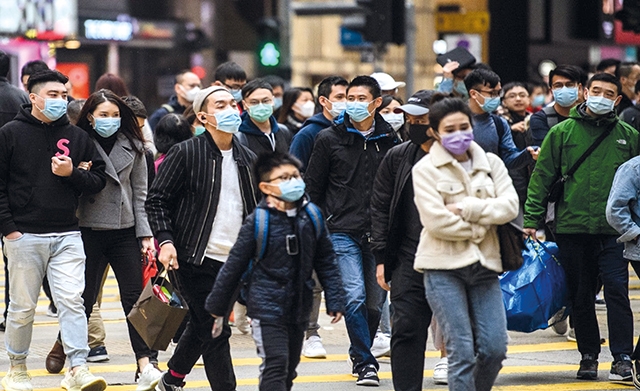Coronavirus Updates
Along with Ebola and Zika, the world has faced many outbreaks of dangerous viruses in the past five years, and the end of 2019 and beginning of 2020 took a less-than-festive turn when a new mysterious virus emerged in the region of Wuhan, China. The coronavirus, also known as 2019-nCoV, has now spread to all regions of China, and has reached 17 countries beyond, among them Thailand, France, the US and Australia, according to the most recent reports.
The BBC presented the kickoff of the coronavirus spread as follows:
31 December 2019 - China alerts the World Health Organization (WHO) about a spate of pneumonia-like cases in Wuhan;
1 January 2020 - The seafood/animal market believed to be at the center of the outbreak is closed;
9 January - WHO says the infection is caused by a new type of coronavirus;
10 January - China shares the genetic code of the new virus;
11 January - Scientists start working on a vaccine, as the first death is confirmed;
The virus spreads - Virus spreads abroad for the first time, with a case in Thailand.
Many things can change in a day. In Tuesday’s edition of GT Business, we reported 100 deaths caused by the new coronavirus. By Wednesday, it had hit 130 in China and up to 6000 infected. Early morning on the day of going to print, we heard that the death toll stands at 170 and the number of people infected with 2019-nCoV amounts to over 7700.
China now has more cases of the coronavirus than it had of SARS, its last worrying viral outbreak. SARS, or severe acute respiratory syndrome, which hit China in 2002-2003, ultimately killed 774 people in 17 countries. The Chinese authorities were severely criticized for their feeble response to the epidemic. But comparing the two viruses is not so easy.
According to current data, the new coronavirus is less likely to result in deaths than SARS, which killed 1 in 10 infected patients. However, experts are concerned with new evidence that the coronavirus can be transmitted before a person shows any signs of illness, rendering it possible that the virus spreads seamlessly throughout the world to reach the most vulnerable people- ultimately resulting in even more deaths.
The World Health Organization met on January 30 to discuss whether the alarmingly fast-spreading virus in fact presents a global health emergency. That evening, it declared the coronavirus outbreak a 'Global Health Emergency."
At its previous meeting, WHO had said it was too soon to declare the virus a global risk. Dr. Tedros Adhanom Ghebreyesus, WHO Director-General, had thereafter stated that WHO "deeply regrets" referring to the worldwide risk from the virus as "moderate" in three reports last week instead of "high". He particularly described the person-to-person spread of the illness in Germany, Vietnam and Japan as worrying.
Prior to Thursday's meeting, Dr Michael Ryan, Executive Director of the WHO Health Emergencies Program, stated that "the whole world needs to be on alert" to fight the coronavirus, the BBC reported. He also praised China's response to the deadly outbreak, saying: "the challenge is great but the response has been massive."
Dr Ryan reported on Wednesday that an international team of experts is being assembled to go to China and learn more about how the disease is transmitted, while working next to the experts there.
Scientists worldwide, from the United States to Australia, are working on creating a treatment. Australian scientists have managed to recreate the new coronavirus outside of China, raising hopes that it could be used to develop an early-diagnosis test.
With Tibet confirming its first Coronavirus case, the disease has officially touched every region in China. All but 68 of the 7,711 infection cases have been in mainland China. 1,737 new cases were recorded in the past 24 hours for a total of 7,711 worldwide, according to Chinese officials and the World Health Organization. The real number is likely to be higher. Most of the recent deaths, 37, occurred in Hubei Province, the center of the outbreak. Deaths so far, none of which have been reported as having occurred outside of China, are said to have come to the elderly or those with pre-existing illnesses affecting their immunity.
Countries are taking the necessary measures to guarantee the health of their citizens. The USA, for one, has evacuated 200 citizens from China, landing them in a California military base to be monitored for at least a few days. Australia plans to do the same, except Australians coming from Chinese territories will be evacuated to Christmas Island to be isolated for two weeks.
Passenger-checks in Georgian airports started last week and on January 29, Georgia temporarily stopped direct flights with China. At Thursday’s government meeting, the Prime Minister of Georgia, Giorgi Gakharia, commented on the possibilities of the virus spreading to Georgia.
“If the new coronavirus is detected in Georgia, our healthcare system is fully prepared to respond to it,” he said.
He then called on the relevant agencies to coordinate actions with the Ministry of Health in terms of taking preventive measures against the coronavirus.
"I would like to emphasize the effective moves made by the Ministry of Health against the coronavirus. First, we decided to suspend direct flights with the People's Republic of China, and this was the most effective step we could take. However, the healthcare system is fully prepared to effectively respond to this challenge if such a virus is detected in Georgia," Gakharia noted.
To date, cases of coronavirus have been reported in 17 countries worldwide: China (including Hong Kong and Macau), Taiwan, Australia, Cambodia, Canada, France, Germany, Japan, Malaysia, Nepal, Sri Lanka, Singapore, Thailand, South Korea, USA, Vietnam, and the United Arab Emirates. Cases recorded in Taiwan, Germany, Vietnam and Japan involved patients who had not been to China.
By Nini Dakhundaridze
Image source: The Hill
Related story
WHO Declares Coronavirus a Global Health Emergency












